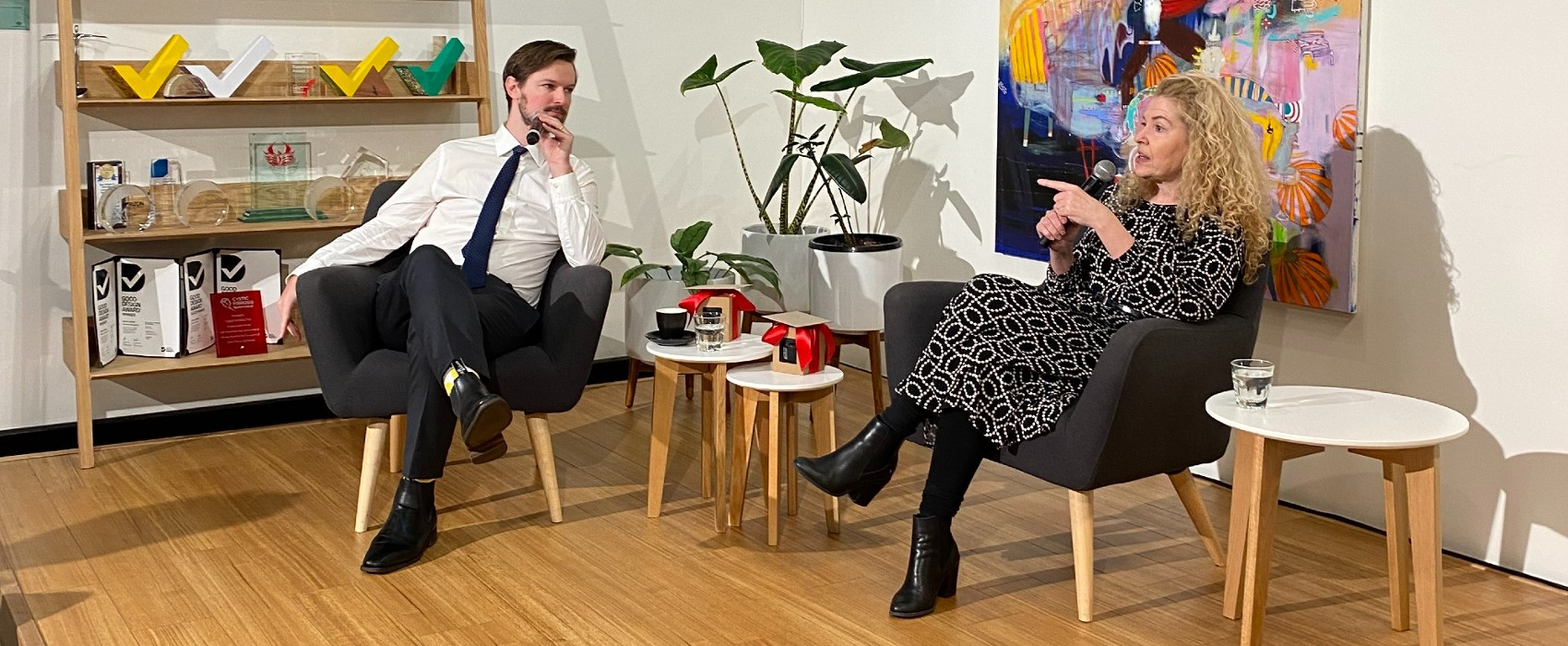Could blockchain be the key to unlocking the collaboration needed across businesses, industries and countries to solve the complex global problems we face?
If it is, there’s still a host of challenges that need to be addressed. Blockchain is not a new technology, but its adoption in Australia has not kept pace with other parts of the world.
If you don’t know a lot about blockchain, I’m sure the broad brushstrokes have been easy enough to grapple with – there's the evangelicals (“it’s decentralised and transparent”) and the sceptics (“it’s dominated by libertarian tech bros”). But it's this binary narrative that doesn’t do it any favours.
So will blockchain save us all? That was the question we posed to our latest Future Led speakers.
Our Future Led series brings together experts on a particular topic to discuss what they know, share their insights, and offer any predictions they might have. It's a conversation between interesting people and we get the opportunity to ask them questions.
Katrina Donaghy, co-founder and CEO of Civic Ledger, and Liam Hennessy, partner at Gadens law firm, agreed on the huge potential of blockchain technology in Australia despite the challenges that still exist, such as regulation, education, and a shortage of skilled workers.

Liam Hennessy & Katrina Donaghy speaking at Future Led.
Ownership and value
There's a myriad of definitions and descriptions of blockchain that already exist, and I’m not sure I can better any of them. But what I took away from the chat was that, at a high level, blockchain can be a tool to rethink socioeconomic systems.
The more day-to-day applications of the technology centre around how value (of an asset, for example) is agreed on or assigned. It involves structuring real-world data in a way that means it can move between multiple digital systems and the underlying value isn’t lost or manipulated.
Or, as Katrina told us, blockchain challenges the concepts of monetary policy and what it means to truly own something.
“One of the things that’s a common thread to all this is about the underlying ownership of an asset. And what are the characteristics of those assets,” she said.
“I think why this technology challenges so many things is because anybody can generate the value. You don’t have to be appointed by government or appointed by legislation or a licence – you can get the technology, mine the coin, and then you have it, and then you can issue it. And that causes some really interesting conversations.”
And blockchain is more than its (coin) parts, as explained by Liam, whose practice focuses on financial services regulation.
"I see it as less of a defined product, in terms of Ether or Bitcoin or derivatives or so forth, but a restructuring of an economic ecosystem which allows trustless transactions,” he said.
“It’s about taking real-world applications and tokenising them for the benefit of those organisations so they can have more efficient transactions, so they can have more trustworthy transactions, so that they can give access to a commerce network that wouldn’t otherwise be available.”
On standards and regulation
So how do we get there? Well, right now there appears to be a mix of positive forward steps and hesitation.
In 2016, Standards Australia was appointed to lead and develop the global standard (ISO) for blockchain technology. For people like Katrina, having this framework is crucial.
“It’s something I can point to and go, these are the standards that we as a company design against – and that is governance,” she said.
Despite this, the ecosystem is still missing elements of regulation, especially for digital currencies.
“We are a country of 26-28 million people on the other side of the planet, away from all the real action. And that hesitancy to come to grips with something that our consumers clearly want and is taking place around the world, and giant corporations are picking up, I see as problematic,” Liam said.
“Our securities regulator has come out and said that Gen Z and Millennials are investing in crypto more than any other asset class.
“What we need in Australia is purposeful, considered, sensible regulation. At the current point in time – we've announced a token-mapping exercise, announced a central bank digital currency trial – that's great. We’re still behind the US and the UK in terms of our regulatory setting for this asset.”
Beyond cryptocurrencies
Digital currencies might be the most commonly recognised blockchain asset, but the benefits of the technology are still not widely understood or appreciated, according to Katrina.
That’s not about the workings of the tech itself — it’s about the impacts it can have on businesses.
“It’s not the tech – it's humans. It’s about shifting business models,” Katrina said. “It’s about rethinking how we share value with each other... you have to move from silos to ecosystems.
“Not one person, not one start-up – blockchain, whatever – can solve the problems we face as a planet. We have to collaborate together. And that’s what I love about this industry.
“But to do that is hard work, because when you think about how we work: we work with paper, we work in Excel, we don’t understand data structure, we don’t understand interoperability, and these are the fundamentals that we need to build.
“So it’s about a complete education experience in the first instance. And then you’re looking for someone who will make that decision. And they’re very rare.”
But of course, it is also about the tech. On that front, there’s still a major hurdle in Australia.
“Why we’re not accelerating fast enough in this country is because we don’t have enough developers,” Katrina said.
And that isn’t a problem for multinational corporations that are motivated by different things.
“China aside, blockchain and web3 is largely being built by big commercial corporations. They’re not doing that out of this potential utopian dream. It is for profit,” Liam said.
“So if you have something that is a structural criticality for economies around the world being created by rapacious private interests – what do you think that’s going to look like, outside of the angels on the side of blockchain who are doing it to make our lives better?”
Learn more:
Our Future Led series:
